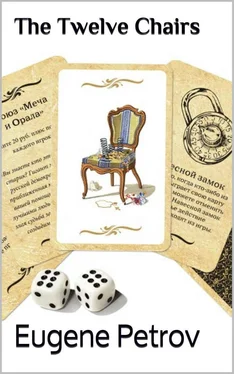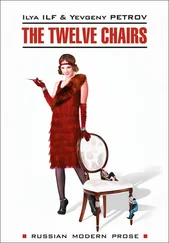Eugene Petrov - The Twelve Chairs
Здесь есть возможность читать онлайн «Eugene Petrov - The Twelve Chairs» весь текст электронной книги совершенно бесплатно (целиком полную версию без сокращений). В некоторых случаях можно слушать аудио, скачать через торрент в формате fb2 и присутствует краткое содержание. Год выпуска: 2013, Жанр: Юмористическая проза, на английском языке. Описание произведения, (предисловие) а так же отзывы посетителей доступны на портале библиотеки ЛибКат.
- Название:The Twelve Chairs
- Автор:
- Жанр:
- Год:2013
- ISBN:нет данных
- Рейтинг книги:5 / 5. Голосов: 1
-
Избранное:Добавить в избранное
- Отзывы:
-
Ваша оценка:
- 100
- 1
- 2
- 3
- 4
- 5
The Twelve Chairs: краткое содержание, описание и аннотация
Предлагаем к чтению аннотацию, описание, краткое содержание или предисловие (зависит от того, что написал сам автор книги «The Twelve Chairs»). Если вы не нашли необходимую информацию о книге — напишите в комментариях, мы постараемся отыскать её.
Find traces of a separate headset difficult and heroes face different adventures and troubles.
The Twelve Chairs — читать онлайн бесплатно полную книгу (весь текст) целиком
Ниже представлен текст книги, разбитый по страницам. Система сохранения места последней прочитанной страницы, позволяет с удобством читать онлайн бесплатно книгу «The Twelve Chairs», без необходимости каждый раз заново искать на чём Вы остановились. Поставьте закладку, и сможете в любой момент перейти на страницу, на которой закончили чтение.
Интервал:
Закладка:
see no sign of a walnut chair with curved legs and English chintz
upholstery. The iron-smooth walls were plastered with directives issued to
the Second Home. Ostap read them and, from time to time, asked
enthusiastically:
"Are the chimneys swept regularly? Are the stoves working properly?"
And, receiving exhaustive answers, moved on.
The fire inspector made a diligent search for at least one corner of
the house which might constitute a fire hazard, but in that respect
everything seemed to be in order. His second quest, however, was less
successful. Ostap went into the dormitories. As he appeared, the old women
stood up and bowed low. The rooms contained beds covered with blankets, as
hairy as a dog's coat, with the word "Feet" woven at one end. Below the beds
were trunks, which at the initiative of Alexander Yakovlevich, who liked to
do things in a military fashion, projected exactly one-third of their
length.
Everything in the Home was marked by its extreme modesty; the furniture
that consisted solely of garden benches taken from Alexander Boulevard (now
renamed in honour of the Proletarian Voluntary Saturdays), the paraffin
lamps bought at the local market, and the very blankets with that
frightening word, "Feet". One feature of the house, however, had been made
to last and was developed on a grand scale-to wit, the door springs.
Door springs were Alexander Yakovlevich's passion. Sparing no effort,
he fitted all the doors in the house with springs of different types and
systems. There were very simple ones in the form of an iron rod;
compressed-air ones with cylindrical brass pistons; there were ones with
pulleys that raised and lowered heavy bags of shot. There were springs which
were so complex in design that the local mechanic could only shake his head
in wonder. And all the cylinders, springs and counterweights were very
powerful, slamming doors shut with the swiftness of a mousetrap. Whenever
the mechanisms operated, the whole house shook. With pitiful squeals, the
old women tried to escape the onslaught of the doors, but not always with
success. The doors gave the fugitives a thump in the back, and at the same
time, a counterweight shot past their ears with a dull rasping sound.
As Bender and the assistant warden walked around the house, the doors
fired a noisy salute.
But the feudal magnificence had nothing to hide: the chair was not
there. As the search progressed, the fire inspector found himself in the
kitchen. Porridge was cooking in a large copper pot and gave off the smell
that the smooth operator had noticed in the hall. Ostap wrinkled his nose
and said: "What is it cooking in? Lubricating oil?" "It's pure butter, I
swear it," said Alchen, blushing to the roots of his hair. "We buy it from a
farm." He felt very ashamed.
"Anyway, it's not a fire risk," observed Ostap. The chair was not in
the kitchen, either. There was only a stool, occupied by the cook, wearing a
cap and apron of mouse-grey woollen material.
"Why is everybody's clothing grey? That cloth isn't even fit to wipe
the windows with!" The shy Alchen was even more embarrassed. "We don't
receive enough funds." He was disgusted with himself.
Ostap looked at him disbelievingly and said: "That is no concern of the
fire brigade, which I am at present representing." Alchen was alarmed.
"We've taken all the necessary fire precautions," he declared. "We even
have a fire extinguisher. An Eclair."
The fire inspector reluctantly proceeded in the direction of the fire
extinguisher, peeping into the lumber rooms as he went. The red-iron nose of
the extinguisher caused the inspector particular annoyance, despite the fact
that it was the only object in the house which had any connection with fire
precautions. "Where did you get it? At the market?" And without waiting for
an answer from the thunderstruck Alexander Yakovlevich, he removed the
Eclair from the rusty nail on which it was hanging, broke the capsule
without warning, and quickly pointed the nose in the air. But instead of the
expected stream of foam, all that came out was a high-pitched hissing which
sounded like the ancient hymn "How Glorious Is Our Lord on Zion".
"You obviously did get it at the market," said Ostap, his earlier
opinion confirmed. And he put back the fire extinguisher, which was still
hissing, in its place.
They moved on, accompanied by the hissing.
Where can it be? wondered Ostap. I don't like the look of things. And
he made up his mind not to leave the place until he had found out the truth.
While the fire inspector and the assistant warden were crawling about
the attics, considering fire precautions in detail and examining the
chimneys, the Second Home of the Stargorod Social Security Administration
carried on its daily routine.
Dinner was ready. The smell of burnt porridge had appreciably
increased, and it overpowered all the sourish smells inhabiting the house.
There was a rustling in the corridors. Holding iron bowls full of porridge
in front of them with both hands, the old women cautiously emerged from the
kitchen and sat down at a large table, trying not to look at the refectory
slogans, composed by Alexander Yakolevich and painted by his wife. The
slogans read:
FOOD IS THE SOURCE OF HEALTH
ONE EGG CONTAINS AS MUCH FAT AS A HALF-POUND OF MEAT
BY CAREFULLY MASTICATING YOUR FOOD YOU HELP SOCIETY
MEAT IS BAD FOR YOU
These sacred words aroused in the old ladies memories of teeth that had
disappeared before the revolution, eggs that had been lost at approximately
the same time, meat that was inferior to eggs in fat, and perhaps even the
society that they were prevented from helping by careful mastication.
Seated at table in addition to the old women were Isidor, Afanasy,
Cyril and Oleg, and also Pasha Emilevich. Neither in age nor sex did these
young men fit into the pattern of social security, but they were the younger
brothers of Alchen, and Pasha Emilevich was Alexandra Yakovlevna's cousin,
once removed. The young men, the oldest of whom was the thirty-two-year-old
Pasha Emilevich, did not consider their life in the pensioners' home in any
way abnormal. They lived on the same basis as the old women; they too had
government-property beds and blankets with the word "Feet"; they were
clothed in the same mouse-grey material as the old women, but on account of
their youth and strength they ate better than the latter. They stole
everything in the house that Alchen did not manage to steal himself. Pasha
could put away four pounds of fish at one go, and he once did so, leaving
the home dinnerless.
Hardly had the old women had time to taste their porridge when the
younger brothers and Pasha Emilevich rose from the table, having gobbled
down their share, and went, belching, into the kitchen to look for something
more digestible.
The meal continued. The old women began jabbering:
"Now they'll stuff themselves full and start bawling songs."
"Pasha Emilevich sold the chair from the recreation room this morning.
A second-hand dealer took it away at the back door."
"Just you see. He'll come home drunk tonight."
At this moment the pensioners' conversation was interrupted by a
trumpeting noise that even drowned the hissing of the fire extinguisher, and
a husky voice began:
'. . . vention .. ."
The old women hunched their shoulders and, ignoring the loudspeaker in
Читать дальшеИнтервал:
Закладка:
Похожие книги на «The Twelve Chairs»
Представляем Вашему вниманию похожие книги на «The Twelve Chairs» списком для выбора. Мы отобрали схожую по названию и смыслу литературу в надежде предоставить читателям больше вариантов отыскать новые, интересные, ещё непрочитанные произведения.
Обсуждение, отзывы о книге «The Twelve Chairs» и просто собственные мнения читателей. Оставьте ваши комментарии, напишите, что Вы думаете о произведении, его смысле или главных героях. Укажите что конкретно понравилось, а что нет, и почему Вы так считаете.












